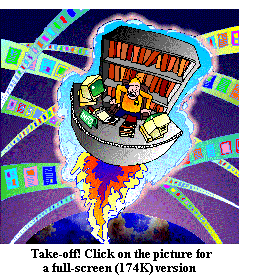eLib Starts to Deliver
The Electronic Libraries Programme, funded by JISC as a consequence of the Follett Report into UK academic libraries, is now properly underway.
The UK Higher Education funding councils have committed £15 million to the programme, which will aim to pave the way towards the fully electronic library of the future.
The Electronic Libraries Programme, funded by JISC as a consequence of the Follett Report into UK academic libraries, is now properly underway.
The UK Higher Education funding councils have committed £15 million to the programme, which will aim to pave the way towards the fully electronic library of the future.
Among the key recommendations of the 1993  Follett Report was the need to invest in IT in order that the nation’s university libraries are able to exploit the developments in computing power and infrastructure now happening globally.
Follett Report was the need to invest in IT in order that the nation’s university libraries are able to exploit the developments in computing power and infrastructure now happening globally.
Last year JISC set up the Follett Implementation Group in IT (FIGIT), which issued a call for proposals within seven identified programme areas . From hundreds of proposals from all over the UK, some forty funded projects have now emerged.
The programme spreads its net more widely than traditional librarianship. Electronic publishing will  also be fostered. The Electronic Journals area will include the development of new titles as well as initiatives with print publishers to provide online versions of their publications. New electronic journals in various disciplines are planned. In addition, a number of projects will develop tools to support scholarly communication, pointing the way forward to a time when the very notion of a journal may no longer be relevant.
also be fostered. The Electronic Journals area will include the development of new titles as well as initiatives with print publishers to provide online versions of their publications. New electronic journals in various disciplines are planned. In addition, a number of projects will develop tools to support scholarly communication, pointing the way forward to a time when the very notion of a journal may no longer be relevant.
Another major area is ‘on-demand publishing’. Seven projects have been funded to work in this area, which will realise the objective which libraries have had for many years of shifting their essential service orientation away from ‘holdings to ‘access’. No university library can realistically hold all the information its users require, and in any case more and more of that information is only available by accessing remote databases and databanks. Access provision therefore becomes the key aim, and on-demand publishing will create texts which can be read on screen, downloaded to disk or simply printed out as students require them. A related area is ‘electronic document delivery’. Four projects have been successful here, and the technical, legal and economic obstacles of this centrally important library service will all be addressed.
Gateway services have already proved their worth in the shared academic electronic environment. eLib is taking forward the gateway concept by finding several subject-based gateway services. Digitisation of existing materials is another programme area, allowing eLib to deliver benefits to those whose research involves the use of older printed materials.
Underpinning the whole eLib programme is training and awareness, and FIGIT has recognised the importance of this area by devoting an entire programme area to it, with five projects already approved.
As a national programme, eLib has succeeded in ensuring that there is as widespread a commitment as possible to the success of the programme. As consortia begin their work with launches and early deliverables in the form of Web sites and pages, Chris Rusbridge, Programme Director, expressed satisfaction at the stage the programme has reached, comparing the spread of projects to “a shotgun blast across the horizon”. But more are to follow. Last month, JISC launched another call, for projects in the areas of grey literature, quality assurance, and electronic reserve collections.
Keeping in touch with the Electronic Libraries Programme
There are several ways to keep in touch with developments in the eLib programme:
- Read Ariadne on a regular basis! There will be updates of eLib events, progress and deliverables, in and between every edition.
- Keep an eye on the eLib Web pages - as well as having details of all of the projects, these also contain background information, reports, and links to all projects with their own Web pages.
- Join (and contribute to) lis-elib, the main mailing list for discussions on topics arising and relevant to the programme and its projects.
- If you find a project interesting, get in touch; maybe you can do something of mutual benefit. For example, the Netskills project are keen to hear from people/institutions that can hold Netskills training sessions.
Other eLib features in this issue
There are several other eLib related features in this first issue of Ariadne:
- OMNI - Frank Norman describes an emerging key gateway to medical resources.
- CLIC - Henry Rzepa gives us a glimpse of the future of electronic journals in the fields of molecular sciences.
- EduLib - Jane Core describes a project that uses a cascading technique to train higher education librarians on a national scale
